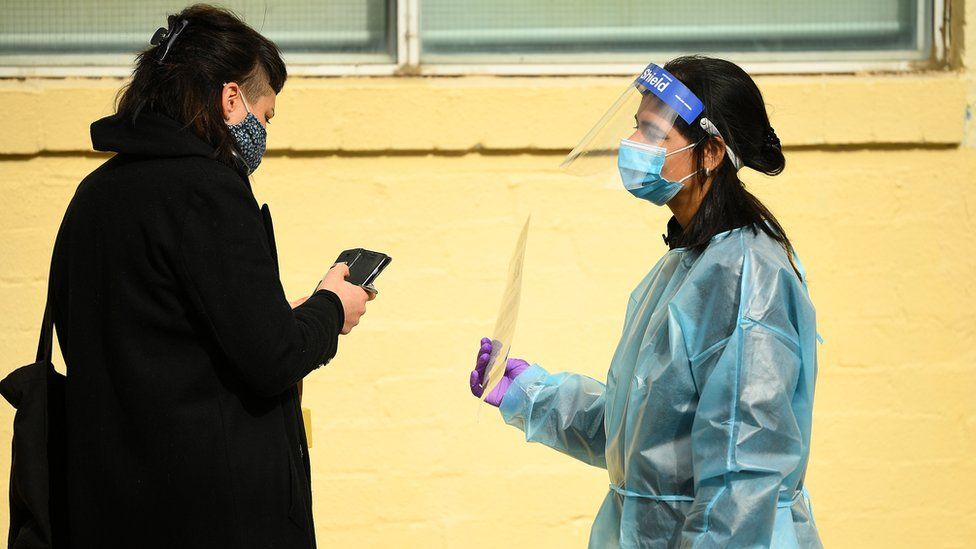
Australia's second most populous state Victoria will enter a seven-day lockdown to counter a fast-spreading outbreak in its capital, Melbourne.
The lockdown will begin at midnight on Thursday (14:00 GMT).
Authorities have so far found 26 cases, and identified 150 sites where people may have been exposed to the virus.
There is growing anxiety over the outbreak which reminds many locals of a devastating second wave that swept the state last year.
Victoria's acting Premier James Merlino said the outbreak involved a highly contagious strain of the virus, the B.1.617 variant. A returned traveller was infected with the strain, which Mr Merlino said was spreading "faster than we have ever recorded".
Cases have been found across the state with links to a large number of venues, including packed football games at stadiums in Melbourne.
"With 10,000 primary and secondary contacts of cases, with more than 150 exposure sites right around the state of Victoria, we need to act now," Mr Merlino said.
"If we wait too long, this thing will get away from us."

Melbourne has been there before. And this is precisely why there's a great deal of nervousness and anxiety in Australia's second city this evening as it prepares for another strict lockdown.
Photos of empty supermarket shelves have circulated on social media with someone tweeting: "Here we go again!" Others are sympathising with the city saying: "Take a deep breath Melbourne."
Compared to the rest of the world, 26 cases is extremely low - but there are a number of worrying factors.
There are 10,000 primary and secondary contacts, so there's big potential for the number of community cases to increase. The circle of exposure sites has also widened including regional Victoria which will be a big and complex job for contact tracers.
More crucially, not enough people have been vaccinated. Which has brought to light once again how slow, and frankly, at times shambolic Australia's vaccine roll out has been.
In some areas there've been complaints that people show up and there aren't enough jabs. In others the vaccines have been lying in fridges unused.
What's clear is that whatever the government has been doing hasn't worked to get more jabs in arms. There have been continued calls for a consistent and a more direct campaign about the urgency for people to get vaccinated.
For the past year the numbers have told Australia's success story in containing and for a while eliminating the virus - but the numbers are telling an opposite story when it comes to vaccinations. And all it takes is an outbreak like we're seeing in Melbourne to put that success at risk.

For the next seven days, Victorians will be required to stay at home except for essential work, shopping, exercise, caregiving or to get a Covid vaccine. No gatherings are allowed and travel is restricted to within 5km (3.1 miles) of the home.
Mask wearing will be mandatory. Schools will be closed except for children of essential workers. Places of worship and all non-essential venues will also be shut.
Other Australian states are expected to limit movement from Victoria, with South Australia already blocking travellers from the state.
The new outbreak marks the biggest increase in community transmission of the virus since the state came out of a second wave in October 2020.
That outbreak caused more than 20,000 infections and 820 deaths - about 70% of cases and most of the fatalities nationwide.
The latest outbreak has been traced to an overseas traveller who tested negative while in quarantine in South Australia. Anyone arriving in Australia from abroad must also complete mandatory, 14-day quarantine. The traveller developed symptoms and tested positive six days after flying back to Melbourne.
Vaccination delays
Australia has staved off widespread transmission of the virus through strict border controls, snap lockdowns and quarantine measures.
It has also been slow to vaccinate its population, and the latest outbreak has prompted renewed calls for Australians to get their jab.
The country's Covid immunisation rollout has been beset with delays due to supply and logistical problems, as well as rising hesitancy to get the jab among some groups. So far, less than 10% of the population has been vaccinated.
"The vaccine rollout has been slower than we have hoped. It's not where we hoped it would be, it's not where it should be," said Mr Merlino.
"If more people were vaccinated, we might be facing a very different set of circumstances than we are today. But sadly we are not."
The country is conducting a staged rollout based on age and vulnerability, but Mr Merlino said anyone aged over 40 in the state would now be eligible to receive a jab.
On Wednesday, the federal government pledged to send an extra 140,000 doses of the AstraZeneca vaccine to Melbourne to boost protection of elderly and other vulnerable groups.
World - Latest - Google News
May 27, 2021 at 01:46PM
https://ift.tt/3oURIuf
Melbourne lockdown: Fears over outbreak sparks restrictions - BBC News
World - Latest - Google News
https://ift.tt/2SeTG7d
https://ift.tt/35oCZy1
Bagikan Berita Ini














0 Response to "Melbourne lockdown: Fears over outbreak sparks restrictions - BBC News"
Post a Comment